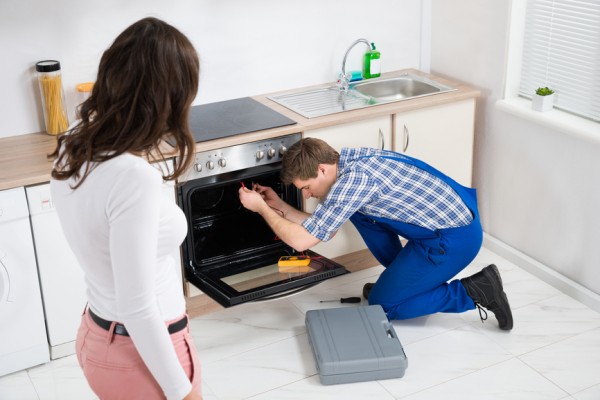Evaluating Your Options: Repairing vs. Replacing Your Oven
An oven is a major appliance in any kitchen, facilitating easy cooking and baking. Over time, however, ovens may encounter issues that affect their performance and functionality. When faced with a malfunctioning oven, homeowners are often confronted with whether to repair or replace it. This article will explore the factors to consider when choosing, exploring the pros and cons of repairing versus replacing an oven.
Assessing the Severity of the Problem:
The first step in determining whether to repair or replace your oven is to assess the severity of the problem. Some issues can be resolved through simple repairs, such as replacing a faulty heating element or a malfunctioning thermostat. If the problem is isolated and the oven is otherwise in good condition, a repair might be cost-effective.
On the other hand, if the oven experiences chronic problems or exhibits multiple issues simultaneously, it may indicate that replacement is the better option. Frequent breakdowns and recurring malfunctions can mean underlying problems that are not easily fixable. In such cases, investing in repairs may become more costly in the long run.
Cost Considerations:
The cost is one of the most critical factors in the repair versus replacement decision. Repairs can vary significantly in expense depending on the problem’s nature and the parts’ availability. Minor repairs, such as replacing a broken knob or a worn-out gasket, are generally more affordable. However, major repairs, such as replacing control boards or repairing complex wiring, can be costly.
It’s essential to compare the cost of repairs with the price of a new oven. If the repair cost exceeds a significant portion of the oven’s value or the oven is already approaching the end of its lifespan, it may be more financially prudent to opt for a replacement. Additionally, consider the warranty status of your oven. Repairs may be covered if it is still under warranty, minimizing the financial burden.
Energy Efficiency:
Energy efficiency is another crucial aspect when deciding between repair and replacement. Older ovens tend to be less energy efficient compared to newer models. If your range is outdated and consumes excessive power, replacing it with a more energy-efficient option may be worthwhile. More unique ovens often come with advanced features such as improved insulation, better temperature control, and energy-saving modes, reducing energy consumption and lowering utility bills.
Functionality and Convenience:
The functionality and convenience of your oven play a significant role in determining whether to repair or replace it. Consider your cooking needs and lifestyle. If your current range lacks essential features or doesn’t meet your requirements, replacing it with a newer model may offer the convenience and functionality you desire. New ovens often come with innovative features such as convection cooking, intelligent technology integration, and self-cleaning options, enhancing the cooking experience and making kitchen tasks more efficient.
Additionally, evaluate the availability of parts for your oven. If your oven is an older model and replacement parts are challenging to find, it may be a limiting factor in repairs. Newer ovens have readily available parts, ensuring timely maintenance in case of malfunctions.
Lifespan and Age of the Oven:
Consider your oven’s age and expected lifespan when making the repair versus replacement decision. Most ovens have an average lifespan of 10 to 15 years, depending on usage and maintenance. If your oven is relatively new and encounters a fixable issue, repairing it makes sense to maximize its lifespan and get the most value out of it.
However, if your oven is approaching the end of its expected lifespan or has already surpassed it, replacement may be the more sensible option. Aging ovens are more prone to developing multiple issues, and repairs can become frequent and costly. Investing in a new oven ensures reliability, improved performance, and longevity.
Environmental Considerations:
Environmental impact is vital to contemplate when deciding between repair and replacement. Repairing your oven promotes sustainability by extending its useful life and reducing waste. By opting for repairs, you contribute to a circular economy and help minimize the environmental footprint of manufacturing and disposing of new appliances.
However, it’s worth noting that newer ovens are often more energy-efficient, leading to reduced energy consumption and lower greenhouse gas emissions. If your current range is outdated and inefficient, replacing it with a more environmentally friendly model can be a proactive step toward reducing your household’s carbon footprint.
When faced with a malfunctioning oven, the decision to repair or replace it should be based on carefully evaluating various factors. Assess the severity of the problem, consider the cost of repairs versus the price of a new oven, and weigh your current oven’s energy efficiency, functionality, and convenience. Consider the lifespan and age of your oven, as well as the environmental implications of your decision.
Ultimately, there is no one-size-fits-all answer for repairing or replacing an oven. Each situation is unique, and homeowners must consider their specific circumstances and priorities. By considering these factors and making an informed decision, you can ensure optimal cooking experiences and value for your investment.
Suppose you are having oven issues and need oven repair in Oklahoma City contact Appliance Repair OKC Services by calling 405-378-4566 or visit our website at https://www.okcappliance.com. Alternatively you can also visit our Google business website at https://cutt.ly/YEnc8qk.

